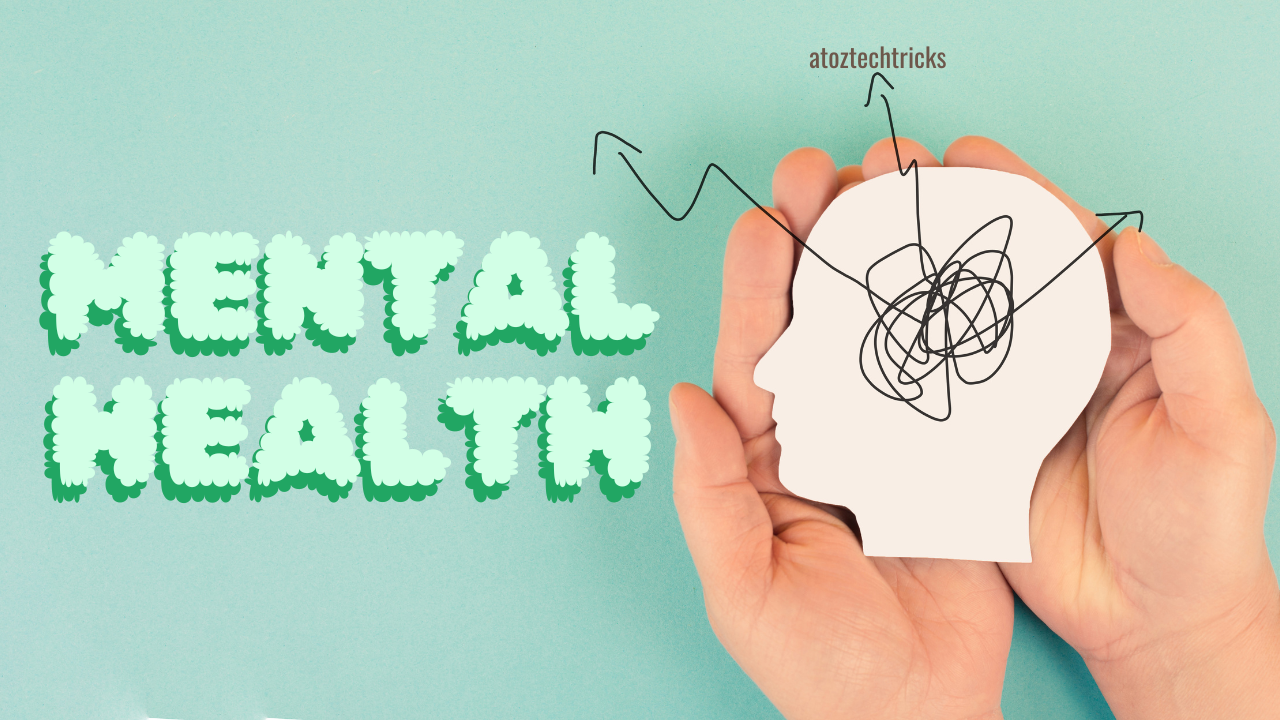Mental Health: Understanding, Promoting, and Sustaining Wellbeing
Mental health is a fundamental aspect of overall health and well-being. It influences how we think, feel, and act, and it plays a crucial role in how we handle stress, relate to others, and make decisions. However, mental health is often misunderstood and stigmatized, leading to a lack of proper attention and care. This article will explore the importance of mental health, the common challenges people face, the impact of mental illness, and strategies for promoting and maintaining good mental health.
Understanding Mental Health
Mental health encompasses our emotional, psychological, and social well-being. It affects how we handle stress, relate to others, and make choices. Mental health is important at every stage of life, from childhood and adolescence through adulthood. Good mental health means more than just the absence of mental disorders; it includes the ability to manage life’s challenges, build strong relationships, and recover from setbacks.
Common Mental Health Challenges
Mental health challenges are more common than many people realize. According to the World Health Organization (WHO), one in four people will be affected by a mental health condition at some point in their lives. Common mental health disorders include anxiety, depression, bipolar disorder, schizophrenia, and post-traumatic stress disorder (PTSD).
Mental Health in the Workplace: Importance, Challenges, and Solutions
- Anxiety Disorders: Anxiety disorders are among the most common mental health conditions. They include generalized anxiety disorder (GAD), panic disorder, social anxiety disorder, and specific phobias. Anxiety disorders are characterized by excessive fear or worry that interferes with daily activities.
- Depression: Depression is a mood disorder that causes persistent feelings of sadness and loss of interest in activities. It can lead to a variety of emotional and physical problems and can decrease a person’s ability to function at work and home.
- Bipolar Disorder: Bipolar disorder is characterized by extreme mood swings that include emotional highs (mania or hypomania) and lows (depression). These mood swings can affect a person’s energy, activity levels, and ability to think clearly.
- Schizophrenia: Schizophrenia is a severe mental health disorder that affects how a person thinks, feels, and behaves. People with schizophrenia may seem like they have lost touch with reality, which can be distressing for both them and their loved ones.
- Post-Traumatic Stress Disorder (PTSD): PTSD can develop after a person has experienced or witnessed a traumatic event. It is characterized by flashbacks, nightmares, severe anxiety, and uncontrollable thoughts about the event.

The Impact of Mental Illness
Mental illness can have a profound impact on an individual’s life. It can affect every aspect of a person’s life, including their relationships, work, and overall quality of life. Mental illness can also lead to physical health problems, such as chronic conditions like heart disease and diabetes. The stigma associated with mental illness often prevents people from seeking help, which can exacerbate the problem.
- Impact on Relationships: Mental health disorders can strain relationships with family, friends, and colleagues. For example, depression can make it difficult for a person to communicate or engage with others, leading to isolation. Anxiety disorders can make social interactions overwhelming, causing individuals to withdraw from relationships.
- Impact on Work: Mental health conditions can affect a person’s ability to perform at work. Depression and anxiety can lead to decreased productivity, difficulty concentrating, and increased absenteeism. People with severe mental illnesses may struggle to maintain employment, leading to financial instability.
- Impact on Physical Health: There is a strong connection between mental and physical health. Mental health conditions can lead to physical health problems and vice versa. For example, chronic stress can contribute to heart disease, and depression is linked to an increased risk of chronic illnesses such as diabetes.
- Impact on Quality of Life: Mental illness can significantly reduce a person’s quality of life. It can interfere with daily activities, create financial problems, and lead to feelings of hopelessness and despair. In severe cases, mental illness can lead to suicidal thoughts and behaviours.
Promoting Mental Health
Promoting mental health involves more than just treating mental illness. It includes creating environments that support mental well-being, reducing stigma, and increasing access to mental health services. Here are some strategies for promoting mental health:
- Education and Awareness: Raising awareness about mental health is crucial for reducing stigma and encouraging people to seek help. Education can help people recognize the signs of mental health issues and understand that mental health is an integral part of overall health.
- Creating Supportive Environments: Creating environments that support mental well-being is essential. This can include workplaces that prioritize mental health, schools that provide mental health education and support, and communities that offer resources for mental health care.
- Access to Mental Health Services: Access to mental health services is critical for promoting mental health. This includes making mental health care affordable and accessible, providing mental health services in primary care settings, and offering telehealth options for those who cannot access in-person care.
- Reducing Stigma: Stigma surrounding mental illness prevents many people from seeking help. Reducing stigma involves changing societal attitudes towards mental illness, encouraging open conversations about mental health, and supporting those who are struggling.
- Building Resilience: Resilience is the ability to cope with life’s challenges and bounce back from adversity. Building resilience can help protect against mental health issues. Strategies for building resilience include developing strong relationships, practising mindfulness, and maintaining a positive outlook.
Stigmas Surrounding Mental Health: Understanding, Challenging, and Overcoming
Strategies for Maintaining Good Mental Health
Maintaining good mental health requires ongoing effort. Here are some strategies that can help:
- Healthy Lifestyle: A healthy lifestyle is essential for mental wellbeing. This includes eating a balanced diet, getting regular exercise, getting enough sleep, and avoiding harmful substances such as alcohol and drugs.
- Mindfulness and Relaxation: Mindfulness practices such as meditation, deep breathing, and yoga can help reduce stress and improve mental health. Relaxation techniques can also help manage anxiety and depression.
- Social Connections: Strong social connections are important for mental health. Spending time with loved ones, building a support network, and participating in social activities can help improve mood and reduce feelings of isolation.
- Seeking Help When Needed: It’s important to seek help when needed. If you’re struggling with your mental health, don’t hesitate to reach out to a mental health professional. Early intervention can prevent mental health issues from becoming more severe.
- Setting Realistic Goals: Setting realistic goals can help improve self-esteem and provide a sense of purpose. Break down larger goals into smaller, manageable steps and celebrate your achievements along the way.
- Practising Gratitude: Practicing gratitude can improve mental health by helping you focus on the positive aspects of your life. Keeping a gratitude journal or simply taking time each day to reflect on what you’re thankful for can boost your mood and overall well-being.
- Limiting Stress: Managing stress is crucial for maintaining good mental health. Identify the sources of stress in your life and take steps to reduce them. This might include time management strategies, delegating tasks, or learning to say no.
- Engaging in Activities You Enjoy: Doing things you enjoy can improve your mood and help you relax. Make time for hobbies and activities that bring you joy, whether it’s reading, gardening, painting, or playing a musical instrument.
- Positive Thinking: Adopting a positive mindset can have a significant impact on your mental health. Practice positive self-talk, focus on your strengths, and challenge negative thoughts when they arise.
- Regular Check-Ins: Regularly checking in with yourself can help you stay on top of your mental health. Take time to assess how you’re feeling, identify any areas of concern, and make adjustments as needed.

The Role of Society in Mental Health
Society plays a significant role in shaping mental health outcomes. Social determinants of mental health include factors such as economic stability, education, social and community context, and access to healthcare. Addressing these social determinants is essential for promoting mental health and preventing mental illness.
- Economic Stability: Economic stability is closely linked to mental health. Poverty, unemployment, and financial instability can contribute to stress, anxiety, and depression. Ensuring economic stability through policies that support employment, fair wages, and access to social services can improve mental health outcomes.
- Education: Education is another important determinant of mental health. Access to quality education can provide individuals with the skills and knowledge they need to navigate life’s challenges and improve their mental health. Schools also play a critical role in promoting mental health by providing mental health education and support services.
- Social and Community Context: Social and community factors, such as social support, community engagement, and social cohesion, are important for mental health. Strong social networks and a sense of belonging can protect against mental health issues and promote resilience.
- Access to Healthcare: Access to healthcare, including mental health services, is essential for promoting mental health. This includes access to preventive care, early intervention, and treatment for mental health conditions. Ensuring that mental health care is affordable and accessible can improve mental health outcomes for individuals and communities.
The Future of Mental Health
The future of mental health is promising, with ongoing research and innovation aimed at improving mental health care and outcomes. Advances in technology, such as telehealth and digital mental health tools, are making mental health care more accessible. Increased awareness and advocacy are also leading to a greater focus on mental health at the societal level.
- Technology and Mental Health: Technology is playing an increasingly important role in mental health care. Telehealth services are making mental health care more accessible, especially for those in remote or underserved areas. Digital mental health tools, such as apps and online therapy platforms, are providing new ways for people to access mental health support and resources. These innovations offer the potential to reach more people, provide support in real-time, and tailor interventions to individual needs.
- Integrated Care Models: The integration of mental health services into primary care settings is another promising development. By combining mental health and physical health care, patients can receive holistic treatment that addresses both their physical and mental health needs. This approach can reduce stigma, improve access to care, and enhance overall health outcomes.
- Early Intervention and Prevention: Increasing focus on early intervention and prevention is crucial for improving mental health outcomes. Early identification of mental health issues can lead to more effective treatment and reduce the severity of conditions. Preventive measures, such as mental health education and community programs, can help build resilience and prevent the onset of mental health issues.
- Advocacy and Policy Change: Advocacy efforts are essential for driving policy changes that support mental health. Increased awareness and understanding of mental health issues are leading to changes in legislation, funding, and public policy. These changes aim to improve access to mental health care, reduce stigma, and support mental health research.
- Research and Innovation: Ongoing research is expanding our understanding of mental health and improving treatment options. Innovations in neuroscience, psychology, and psychiatry are providing new insights into the causes of mental health disorders and developing more effective therapies. Research into the social determinants of mental health is also helping to identify ways to address systemic issues that impact mental health.
Mental health is a crucial component of overall well-being that affects every aspect of our lives. Understanding mental health, recognizing common challenges, and promoting mental well-being are essential for creating a healthier and more supportive society. By addressing mental health issues with compassion, reducing stigma, and increasing access to care, we can improve the quality of life for individuals and communities.
Promoting mental health involves a multifaceted approach that includes education, creating supportive environments, reducing stigma, and providing access to services. Maintaining good mental health requires ongoing effort and the adoption of strategies that support emotional and psychological well-being. The role of society in shaping mental health outcomes is significant, and addressing social determinants is key to promoting mental health and preventing mental illness.

The future of mental health is bright, with advancements in technology, integrated care models, early intervention, and advocacy efforts paving the way for improved mental health care. Continued research and innovation will further enhance our understanding and treatment of mental health conditions. By working together to support mental health, we can create a world where everyone has the opportunity to thrive and live a fulfilling life.




Post Comment